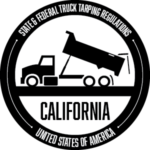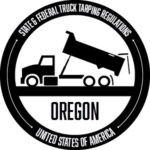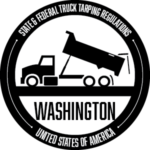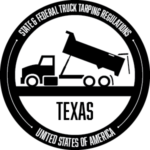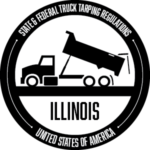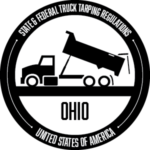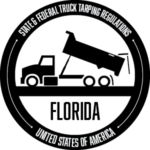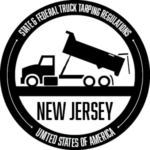Hauling Industry News
Do I Have To Have A Tarp System In My State? Truck Regulations for Each State
Pulltarps Tarp Systems Keep you Legal on the Road
Pulltarps understands the importance of keeping up with federal regulations on the road. Many state laws mandate that no vehicle can be driven on a highway unless the vehicle is covered or loaded to prevent any of its contents from dropping, leaking or otherwise escaping from the vehicle. Each state has it’s own set of hauling regulations for dump trucks and landscaping trailers; states create these cargo covering laws to keep people safe on and near the road. Our tarps ensure your aggregate materials are contained in the cargo area of your vehicle and keep you covered for all state tarp laws.
SEE OUR RESOURCES SECTION TO FIND EVERY STATE’S HAULING LAWS AND REGULATIONS
We manufacture our products in USA, and we ensure high standards with every tarp and tarp system we make. Check your truck tarp system options in our products page to keep your loads covered. Below we have listed some of the regulations for our most frequently asked state tarp laws.
No vehicle shall be driven or moved on any highway unless the vehicle is so constructed, covered, or loaded as to prevent any of its contents or load other than clear water or feathers from live birds from dropping, sifting, leaking, blowing, spilling, or otherwise escaping from the vehicle.
Aggregate material shall only be carried in the cargo area of a vehicle. The cargo area shall not contain any holes, cracks, or openings through which that material may escape, regardless of the degree to which the vehicle is loaded, except as provided in paragraph (2).
Every vehicle used to transport aggregate materials, regardless of the degree to which the vehicle is loaded, shall be equipped with all of the following:
-
- Properly functioning seals on any openings used to empty the load, including, but not limited to, bottom dump release gates and tailgates.
- Splash flaps behind every tire, or set of tires, regardless of position on the truck, truck tractor, or trailer.
- Center flaps at a location to the rear of each bottom dump release gate as to trucks or trailers equipped with bottom dump release gates. The center flap may be positioned directly behind the bottom dump release gate and in front of the rear axle of the vehicle, or it may be positioned to the rear of the rear axle in line with the splash flaps required behind the tires. The width of the center flap shall extend not more than one inch from one sidewall to the opposite sidewall of the inside tires and shall extend to within five inches of the pavement surface, and shall be not less than 24 inches from the bottom edge to the top edge of that center flap.
- Fenders starting at the splash flap with the leading edge of the fenders extending forward at least six inches beyond the center of the axle which cover the tops of tires not already covered by the truck, truck tractor, or trailer body
- Complete enclosures on all vertical sides of the cargo area, including, but not limited to, tailgates.
- Shed boards designed to prevent aggregate materials from being deposited on the vehicle body during top loading.
Oregon State Tarp Laws
Operating with sifting or leaking load; civil liability; penalty.
A person commits the offense of operating with a sifting or leaking load if the person does any of the following:
- Drives or moves on a highway any vehicle or combination of vehicles that is so constructed or loaded so as to allow its contents to drop, sift, leak or otherwise escape therefrom.
- Owns a vehicle or combination of vehicles and causes or permits the vehicle or combination of vehicles to be driven or moved on a highway when the vehicle or combination of vehicles is so constructed or loaded so as to allow its contents to drop, sift, leak or otherwise escape therefrom.
The application of this section is subject to the exemptions from this section established under ORS 818.310. Violation of the offense described in this section is subject to civil liability under ORS 818.410. The offense described in this section operating with a sifting or leaking load, is a Class B traffic infraction.
Exemptions: This section establishes exemptions from ORS 818.300. The exemptions under this section are in addition to any exemptions under ORS 801.026. Exemptions are partial or complete as described in the following:
- ORS 818.300 does not apply on any way, thoroughfare or place owned by a district formed under ORS chapters 545, 547, 551 or a corporation formed under ORS chapter 554.
- ORS 818.300 does not apply to any road or thoroughfare or property in private ownership or any road or thoroughfare, other than a state highway or county road, used pursuant to any agreement with any agency of the United States or with a license of such agency or both.
- Operations authorized under the terms of a permit issued under ORS 818.230 are subject to the terms of the permit. It is a defense to any charge of violation of ORS 818.300 if the person so charged produces a permit issued under ORS 818.230 authorizing the operation of the vehicle or combination of vehicles issued prior to and valid at the time of the offense.
Loading so as to spill prohibited; minimum safety standards; penalty.
- No vehicle shall be driven or moved on any public highway unless such vehicle is so constructed or loaded as to prevent any of its load from dropping, sifting, leaking, or otherwise escaping therefrom, except that sand may be dropped for the purpose of securing traction.
- No person may operate on any public highway any vehicle with any load unless the load and such covering as required thereon by subsection (3) of this section is securely fastened to prevent the covering or load from becoming loose, detached, or in any manner a hazard to other users of the highway.
- Any vehicle operating on a paved public highway with a load of dirt, sand, or gravel susceptible to being dropped, spilled, leaked, or otherwise escaping therefrom shall be covered so as to prevent spillage. Covering of such loads is not required if six inches of freeboard is maintained within the bed.
- Any person operating a vehicle from which any glass or objects have fallen or escaped, which would constitute an obstruction or injure a vehicle or otherwise endanger travel upon such public highway shall immediately cause the public highway to be cleaned of all such glass or objects and shall pay any costs therefor. Any vehicle with deposits of mud, rocks, or other debris on the vehicle’s body, fenders, frame, undercarriage, wheels, or tires shall be cleaned of such material before the operation of the vehicle on a paved public highway.
- The state patrol may make necessary rules to carry into effect the provisions of this section, applying such provisions to specific conditions and loads and prescribing means, methods, and practices to effectuate such provisions.
- Nothing in this section may be construed to prohibit a public maintenance vehicle from dropping sand on a highway to enhance traction, or sprinkling water or other substances to clean or maintain a highway.
- A person is guilty of failure to secure a load in the first degree if he or she, with criminal negligence, fails to secure a load or part of a load to his or her vehicle in compliance with subsection (1), (2), or (3) of this section and causes substantial bodily harm to another. Failure to secure a load in the first degree is a gross misdemeanor. A person is guilty of failure to secure a load in the second degree if he or she, with criminal negligence, fails to secure a load or part of a load to his or her vehicle in compliance with subsection (1) or (2) of this section and causes damage to property of another. Failure to secure a load in the second degree is a misdemeanor. A person who fails to secure a load or part of a load to his or her vehicle in compliance with subsection (1), (2), or (3) of this section is guilty of an infraction if such failure does not amount to a violation of (a) or (b) of this subsection.
REQUIREMENTS FOR TRANSPORTING LOOSE MATERIALS
A vehicle subject to this chapter shall be equipped and maintained as required by this section to prevent loose material from escaping by blowing or spilling. A vehicle bed carrying a load may not have a hole, crack, or other opening through which loose material can escape; and shall be enclosed:
- on both sides by side panels;
- on the front by a panel or the vehicle cab; and
- on the rear by a tailgate or panel.
The load shall be covered and the covering firmly secured at the front and back, unless the load:
is completely enclosed by the load-carrying compartment; or
does not blow or spill over the top of the load-carrying compartment.
The tailgate of the vehicle shall be securely closed to prevent spillage during transportation.
Covers or Tarpaulins Required for Certain Loads
No person shall operate or cause to be operated, on a highway, any second division vehicle loaded with dirt, aggregate, garbage, refuse or other similar material, when any portion of the load is falling, sifting, blowing dropping or in any way escaping from the vehicle.
This section shall not apply to the operation of highway maintenance vehicles engaged in removing snow and ice from the roadway, nor to implements of husbandry or other farm vehicles while transporting agricultural products to or from the original place of production.
For the purpose of this section “aggregate” shall include all ores, minerals, sand, gravel, shale, coal, clay, limestone or any other ore or mineral which may be mined.
Notwithstanding any other penalty, whenever a police officer determines that the operator of a vehicle is in violation of this section, as evidenced by the issuance of a citation for a violation of section 15-109.1 of this code, the police officer shall require the operator to stop the vehicle in a suitable place and keep such vehicle stationary until the load has either been reduced, secured or covered with a cover or tarpaulin of sufficient size to prevent any further violation of this section.
No vehicle shall be driven or moved on any highway unless the vehicle is so constructed, loaded, or covered as to prevent any of its load from dropping, sifting, leaking or otherwise escaping therefrom, except that sand or other substances may be dropped for the purpose of securing traction, or water or other substance may be sprinkled on a roadway in cleaning or maintaining the roadway.
Except for a farm vehicle used to transport agricultural produce or agricultural production materials or a rubbish vehicle in the process of acquiring its load, no vehicle loaded with garbage, swill, cans, bottles, waste paper, ashes, refuse, trash, rubbish, waste, wire, paper, cartons, boxes, glass, solid waste or any other material of an unsanitary nature that is susceptible to blowing or bouncing from a moving vehicle shall be driven or moved on any highway unless the load is covered with a sufficient cover to prevent the load or any part of the load from spilling onto the highway.
Loads on Vehicles: A vehicle may not be driven or moved on any highway unless the vehicle is so constructed or loaded as to prevent any of its load from dropping, shifting, leaking, blowing, or otherwise escaping therefrom, except that sand may be dropped only for the purpose of securing traction or water or other substance may be sprinkled on a roadway in cleaning or maintaining the roadway.
It is the duty of every owner and driver, severally, of any vehicle hauling, upon any public road or highway open to the public, dirt, sand, lime rock, gravel, silica, or other similar aggregate or trash, garbage, any inanimate object or objects, or any similar material that could fall or blow from such vehicle, to prevent such materials from falling, blowing, or in any way escaping from such vehicle. Covering and securing the load with a close-fitting tarpaulin or other appropriate cover or a load securing device meeting the requirements of 49 C.F.R.s. 393.100 or a device designed to reasonably ensure that cargo will not shift upon or fall from the vehicle is required and shall constitute compliance with this section.
Loading so as to spill prohibited; minimum safety standards; penalty.
No person shall cause or permit a vehicle to be so loaded or operate a vehicle so loaded that the contents or any part thereof may be scattered in any street. Whenever the load of any vehicle is of material other than farm products susceptible to scattering on a street and such load extends above the height of the sides or tailgate or rear of the body of the vehicle, such load shall be securely covered by a tarpaulin or other cover. The director, where public safety so warrants, shall, after a public hearing, prescribe by rule or regulation minimum safety standards for fastening loads on and fix loading procedures for any commercial type flat bed motor vehicle or motor-drawn vehicle. Any rule or regulation so promulgated by the director shall be filed in the Secretary of State’s office and copies thereof shall be available, upon request, in the director’s office.
The owner, lessee, bailee, or operator of any vehicle described above found on a highway in violation of any such safety standard or procedure that may be prescribed by the director shall be fined not more than $500 for each violation.

